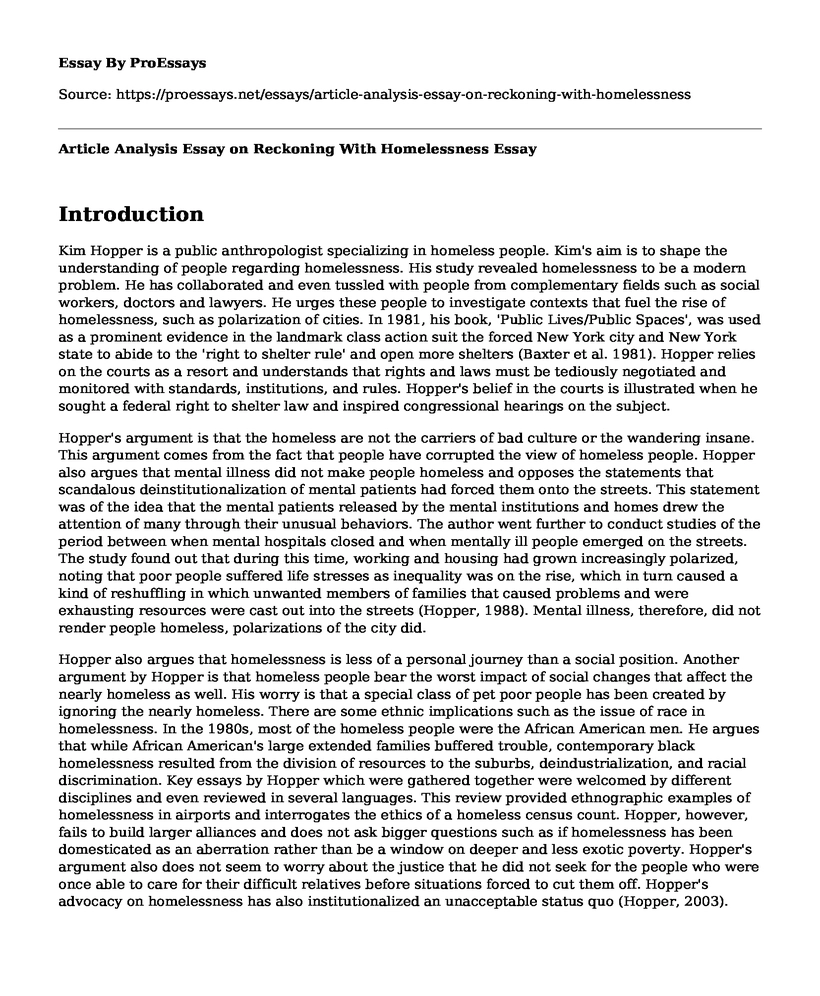Introduction
Kim Hopper is a public anthropologist specializing in homeless people. Kim's aim is to shape the understanding of people regarding homelessness. His study revealed homelessness to be a modern problem. He has collaborated and even tussled with people from complementary fields such as social workers, doctors and lawyers. He urges these people to investigate contexts that fuel the rise of homelessness, such as polarization of cities. In 1981, his book, 'Public Lives/Public Spaces', was used as a prominent evidence in the landmark class action suit the forced New York city and New York state to abide to the 'right to shelter rule' and open more shelters (Baxter et al. 1981). Hopper relies on the courts as a resort and understands that rights and laws must be tediously negotiated and monitored with standards, institutions, and rules. Hopper's belief in the courts is illustrated when he sought a federal right to shelter law and inspired congressional hearings on the subject.
Hopper's argument is that the homeless are not the carriers of bad culture or the wandering insane. This argument comes from the fact that people have corrupted the view of homeless people. Hopper also argues that mental illness did not make people homeless and opposes the statements that scandalous deinstitutionalization of mental patients had forced them onto the streets. This statement was of the idea that the mental patients released by the mental institutions and homes drew the attention of many through their unusual behaviors. The author went further to conduct studies of the period between when mental hospitals closed and when mentally ill people emerged on the streets. The study found out that during this time, working and housing had grown increasingly polarized, noting that poor people suffered life stresses as inequality was on the rise, which in turn caused a kind of reshuffling in which unwanted members of families that caused problems and were exhausting resources were cast out into the streets (Hopper, 1988). Mental illness, therefore, did not render people homeless, polarizations of the city did.
Hopper also argues that homelessness is less of a personal journey than a social position. Another argument by Hopper is that homeless people bear the worst impact of social changes that affect the nearly homeless as well. His worry is that a special class of pet poor people has been created by ignoring the nearly homeless. There are some ethnic implications such as the issue of race in homelessness. In the 1980s, most of the homeless people were the African American men. He argues that while African American's large extended families buffered trouble, contemporary black homelessness resulted from the division of resources to the suburbs, deindustrialization, and racial discrimination. Key essays by Hopper which were gathered together were welcomed by different disciplines and even reviewed in several languages. This review provided ethnographic examples of homelessness in airports and interrogates the ethics of a homeless census count. Hopper, however, fails to build larger alliances and does not ask bigger questions such as if homelessness has been domesticated as an aberration rather than be a window on deeper and less exotic poverty. Hopper's argument also does not seem to worry about the justice that he did not seek for the people who were once able to care for their difficult relatives before situations forced to cut them off. Hopper's advocacy on homelessness has also institutionalized an unacceptable status quo (Hopper, 2003).
Works Cited
Baxter, Ellen, and Kim Hopper. "Private Lives/Public Spaces: Homeless Adults on the Streets of New York City." (1981).
Hopper, Kim. "More than passing strange: Homelessness and mental illness in New York City." American Ethnologist 15.1 (1988): 155-167.
Hopper, Kim. Reckoning with homelessness. Cornell University Press, 2003.
Cite this page
Article Analysis Essay on Reckoning With Homelessness. (2022, May 23). Retrieved from https://proessays.net/essays/article-analysis-essay-on-reckoning-with-homelessness
If you are the original author of this essay and no longer wish to have it published on the ProEssays website, please click below to request its removal:
- Crash Film - Presentation Example
- Displacement of Syrian Women Due to the Syrian Civil War Annotated Bibliography
- Essay Sample on What Is Redlining and How Did Housing Covenant System Affect Communities of Colour
- Article Analysis Essay on How Obama Failed Black Americans
- Eviction, Racism, & Inequality: An American Crisis - Essay Sample
- Drug Use: Impact on Individuals & Society - Essay Sample
- Understanding Homelessness: Applying Point-In-Time Counts - Essay Sample







